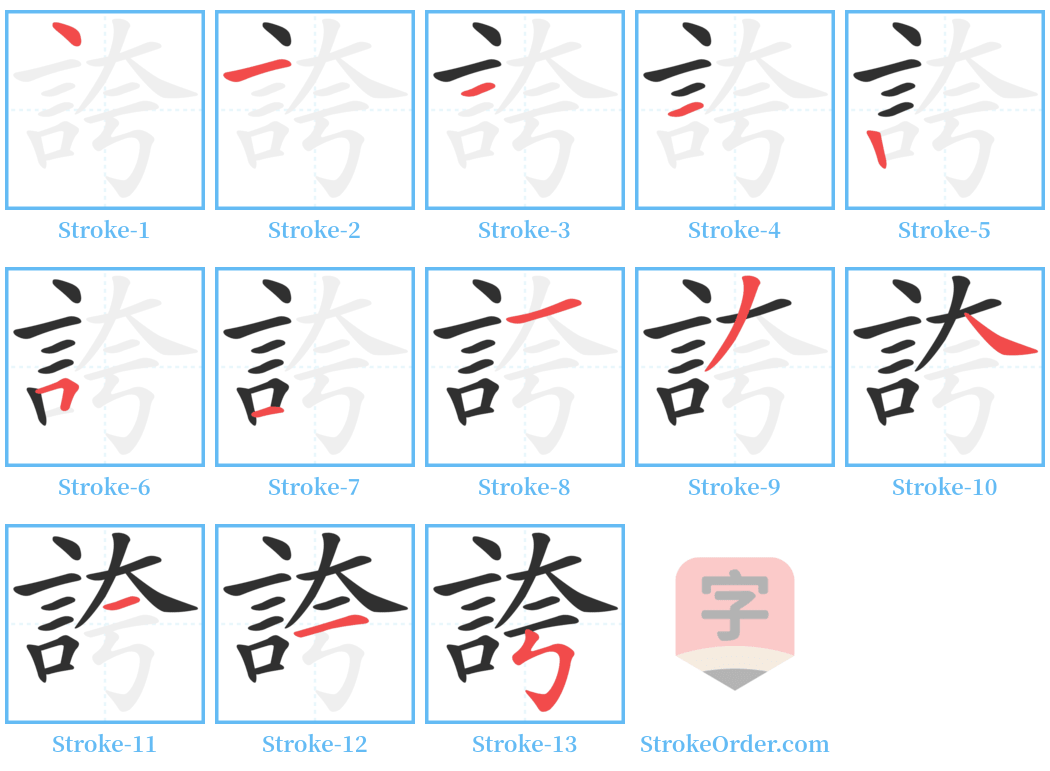誇 Stroke Order
Animated Stroke Order of 誇

Stroke Order Diagrams for 誇

Step-by-Step Handwriting Guide for 誇

Learn to Write Chinese Characters with Video Tutorials
Watch the video of writing the Chinese character "誇", learn the correct stroke order (笔顺) of the character "誇", and master the standard way of writing the character "誇".
Free Printable Handwriting Practice with Stroke Order: 誇
Printable Writing Practice Worksheet of "誇" in Portrait Orientation (Tian Zi Ge)

Printable Writing Practice Worksheet of "誇" in Landscape Orientation (Tian Zi Ge)

Information of 誇
Pinyin
kuā
Radical
言
Strokes
13 strokes
Usage
★★★
Definition
to boast
誇
kuā
[动]
【本义】: 把事情说得或做得超过了原有程度,不符合实际
[Original meaning]: To say or do something beyond its original extent, not in accordance with reality.
【造字法】: 形声。从言,夸声。
[Character composition]: Phono-semantic compound. It consists of the component "言" (speech) and "夸" (to boast).
【意义】
1. 同本义 ([En.] flaunt; glory; show off; exaggerate; overstate; boast)
1.1 誇口;誇燿。
[To boast; to brag.]
1.2 誇奖,誇赞。
[To praise; to commend.]
1.3 粗;大。
[Coarse; large.]
1.4 美丽。
[Beautiful.]
1.5 逞。
[To show off.]
1.6 歌唱。
[To sing.]
1.7 夸大。
[To exaggerate.]
例如: 人人都夸她学习刻苦。
[For example: Everyone praises her for studying diligently.]
1.8 夸奖。
[To commend.]
1.9 姓。
[A surname.]
2. 扩大,张大 ([En.] aggravate; magnify)
2.1 例如: 誇布服,糲食。
[For example: To expand in wear and food.]
3. 通「跨」(kuà)。兼有 ([En.] have both)
3.1 例如: 而藩国大者,夸州兼郡。
[For example: Moreover, the larger fief states also encompass various counties.]
【引】
1. 《通俗文》:自矜曰誇。
[From "Popular Writing": To self-praise is called boasting.]
2. 《字林》:誇,大言也。
[From "Dictionary Forest": Boasting is to speak grandly.]
3. 《管子·白心》:万物均既夸众矣。 注:「大也。」
[From "Guanzi": All things are indeed abundant. Note: 'Great' or 'big.']
4. 《文选·扬雄·长杨赋序》:上将大夸。
[From "Selections of Writings": The general is about to boast greatly.]
5. 《公羊传·庄公九年》:伐败。 注:「自夸大其伐。」
[From "Gongyang Reference": To defeat and fail. Note: 'To boast greatly about the defeat.']
6. 《韩非子·解老》:虽势尊衣美,不以夸贱欺贫。
[From "Han Fei Zi": Even if one's power is great and clothing is beautiful, one should not deceive the poor by boasting.]
【例】
又如:
- 誇詐 (吹噓欺騙)
[To deceive by boasting.]
- 誇誕 (说话荒诞不经)
[To speak absurdly.]
- 誇谈设嘴 (吹噓; 誇口)
[To boast; to brag.]
- 誇詡 (骄傲自夸,炫耀)
[To show off proudly.]
- 人人都誇他愛勞動;
[Everyone praises him for loving to work.]
- 誇耀 (骄傲自夸; 炫耀)
[To show off boastfully.]
- 誇容 (骄傲、炫耀、自夸自大的色)
[Proud and boastful appearance.]